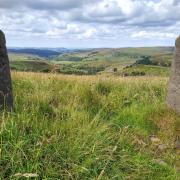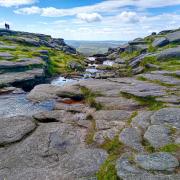Throughout our lives we all experience periods of stress. This could be due to factors such as the pressure of work, taking an exam, the death of a relative or close friend, the credit crunch, being bullied or moving house.
It is not always a bad thing, but prolonged exposure to extreme stress is definitely bad for your health. Many of us have our own ways of dealing with it, but many don't, and stress-related health issues are on the rise.
In the past few years I have experienced three events which have affected my wellbeing - the pandemic, a serious motorbike accident and a health scare. Bad luck can come in threes!
Each affected me differently, but my response was the same - to seek solace in the natural world, usually a walk in a local wood or a ramble across a heather-clad moor.

One thing I've noticed as I have aged is what I do on these walks. Earlier in my career I would have been looking for a specific target, usually a bird, butterfly or flower. My mind would have been focused on my quest and I would have been almost impervious to the habitat around me.
In the past ten years I have started to act differently. I now walk slower, take short rests and maybe sit down for half an hour or so, thus being able to focus far more on small details. Seeing and hearing the natural world that is enveloping me, makes me feel part of it, and I become calmer.
This experience reminds me of a new practice which is rising in popularity - forest bathing.
The Japanese work culture has always been considered as extremely stressful, and one practice which has been developed to help reduce stress is shinrin yoku (forest bathing).

Having watched a programme about it on television, I realised that I unwittingly had been practising it for the past decade and whilst I could attest to its amazing benefits, I didn't know the science behind it.
Forest bathing is a process of relaxation, being calm and quiet, surrounded by trees, whilst looking and listening to nature and the possibilities are endless here in Derbyshire and the wider Peak
During a woodland visit you should sit, or stand still, and breathe deeply, taking longer to exhale than inhale, a natural body-calming mechanism.
As you breathe deeply you will be inhaling a mix of natural chemicals, including oils secreted by the trees, which help boost your immune system.

As you look around, focus on details - the light filtering through the leaves, the shapes of leaves on branches and the forest floor or the mosses and lichens living on tree trunks.
This has two beneficial effects on your body. It helps to clear your mind, and the repeated patterns in nature, known as fractals, are recognised by your brain and help lower mental fatigue.
Observing details is important, but so is listening. Make sure your phone is switched off and sit, or stand, whilst closing your eyes and clearing your mind.
Now focus on your hearing and listen to the rustle of leaves as the breeze plays with them and the sound of birds, those both near and far. As you concentrate, you will feel calmer.

This takes a bit of practice because the issues that may be causing you stress will often creep back into your consciousness but, if you focus on the sounds and learn to appreciate them, you get better at freeing your mind.
As you do so, the levels of cortisol, the stress hormone in your body, start to reduce. The longer you can stay in the wood, the better. The ideal amount of time is two hours. The time of day is not important, I personally prefer early mornings because there are less people about and birds tend to sing more actively.
All the literature I researched only mentioned woodlands but I would suggest that many other habitats would offer similar benefits.

Lying down in a hay meadow in summer is an incredible experience. The whisper of the moving grasses, the serenade of grasshoppers and the gentle hum of bees gathering pollen create one of my major stress-busting, favourite experiences.
Tall reed beds can give an amazing auditory experience as well. Seeking out specific natural experiences can be incredibly beneficial health-wise.
I spend a few evenings every year sitting quietly, listening to the churring of nightjars. A walk across a honey-scented heather moor in August is delightful and, if you use some of the calming strategies of forest bathing, it can be as good a stress reducer as an afternoon in your favourite wood.
If you want to experience the calming and beneficial effects of forest bathing, search the web for organised events in Derbyshire.
However, it is something you can learn to do yourself, either on your own or with your family. Forest England have an excellent guide, the Forest Wellbeing Journal, which can be downloaded online and is an excellent place to start.



























